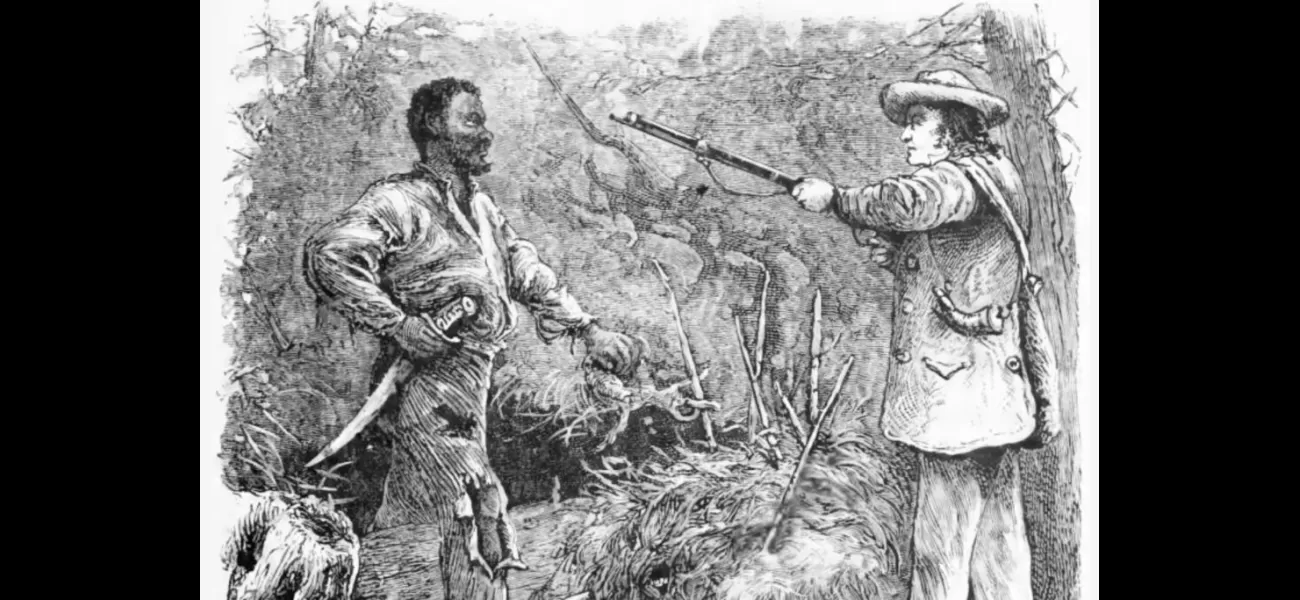Other enslaved people also rose up in rebellion, not just in Haiti.
The Haitian Revolution was a well-known uprising of enslaved individuals, but it was not the only one.
February 6th 2024.

The Haitian Revolution was a momentous event that changed the course of world history. It is often regarded as one of the most successful revolts led by enslaved people, but it was not the only one. There were many other uprisings that had a lasting impact on the fight for liberation. Here are seven of those revolts and their significance.
One of the earliest revolts was the Stono Rebellion of 1739. It is often overlooked in discussions of Black Americans' struggle for freedom, but it was a powerful display of resistance. About 20 enslaved people raided a store in South Carolina, killing the owners and leaving their heads outside as a warning. Trained from their experiences in their home countries or as soldiers in the Yamasee War, the group grew to around 100 fighters as they burned houses and fought against the English. Despite being ultimately defeated, the Stono Revolt inspired over 50 other slave insurrections the following year.
In 869 A.D., the Zanj Rebellion arose in the Middle East. Led by revolutionary leader Ali bin Muhammad, the Zanj people fought against the Abbasid Caliphate. As they captured supplies and gained more rebel soldiers, they even managed to control six cities in what is now Iraq. The rebellion lasted for 15 years before being defeated, but it showed the strength and determination of the enslaved people. Many of the Zanj people were offered a place in the Abbasid army after the rebellion.
The German Coast Uprising of 1811 was orchestrated by Charles Deslondes. About 25 enslaved people attacked the owner of a plantation and his family, killing one of his sons. They then took over the plantation and marched towards New Orleans with plans to capture the city. However, they were met with military forces and eventually ran out of ammunition. The rebellion was crushed, and some insurgents escaped while others were arrested and executed. This revolt served as a warning to slave owners and sparked fear among white Americans.
Nat Turner's Rebellion in 1831 is one of the most well-known slave revolts in history. Turner, along with about 70 enslaved people, sought to abolish slavery through force, using weapons like knives and muskets. Though they were ultimately defeated, the rebellion had lasting consequences. An additional 200 enslaved people were killed in retaliation, and Black people were banned from learning how to read out of fear of another revolt. This uprising marked a turning point for enslaved people, as white Americans grew afraid of their potential if given access to resources.
The Amistad Mutiny of 1839 was a successful rebellion by a group of enslaved Africans on a ship bound for Cuba. They managed to kill the captain and a crew member and steer the ship towards Africa, but the crew eventually turned the ship back towards the United States. The enslaved people were imprisoned, and a lengthy trial ensued. Eventually, the Supreme Court ruled that they had been illegally enslaved and were exercising their right to fight for freedom. The Amistad rebels were finally able to return home with the help of abolitionists.
A group of abolitionists led by John Brown staged a raid on Harpers Ferry, Virginia in 1859. Their plan was to establish a haven for freed slaves, but they were quickly defeated by state and federal troops. Though the rebellion was short-lived, it energized the anti-slavery movement in the South and instilled fear in white slave owners. John Brown became a symbol of martyrdom for his role in the revolt.
Finally, in 1712, a group of over two dozen enslaved people in New York City rose up against their masters. They killed 9 slave owners and injured 6 before fleeing to the north. They were eventually caught and publicly executed, but their revolt challenged the dominant existence of the slave trade in the city. These rebellions, along with the Haitian Revolution, serve as a reminder of the strength and resilience of enslaved people in their fight for freedom.
One of the earliest revolts was the Stono Rebellion of 1739. It is often overlooked in discussions of Black Americans' struggle for freedom, but it was a powerful display of resistance. About 20 enslaved people raided a store in South Carolina, killing the owners and leaving their heads outside as a warning. Trained from their experiences in their home countries or as soldiers in the Yamasee War, the group grew to around 100 fighters as they burned houses and fought against the English. Despite being ultimately defeated, the Stono Revolt inspired over 50 other slave insurrections the following year.
In 869 A.D., the Zanj Rebellion arose in the Middle East. Led by revolutionary leader Ali bin Muhammad, the Zanj people fought against the Abbasid Caliphate. As they captured supplies and gained more rebel soldiers, they even managed to control six cities in what is now Iraq. The rebellion lasted for 15 years before being defeated, but it showed the strength and determination of the enslaved people. Many of the Zanj people were offered a place in the Abbasid army after the rebellion.
The German Coast Uprising of 1811 was orchestrated by Charles Deslondes. About 25 enslaved people attacked the owner of a plantation and his family, killing one of his sons. They then took over the plantation and marched towards New Orleans with plans to capture the city. However, they were met with military forces and eventually ran out of ammunition. The rebellion was crushed, and some insurgents escaped while others were arrested and executed. This revolt served as a warning to slave owners and sparked fear among white Americans.
Nat Turner's Rebellion in 1831 is one of the most well-known slave revolts in history. Turner, along with about 70 enslaved people, sought to abolish slavery through force, using weapons like knives and muskets. Though they were ultimately defeated, the rebellion had lasting consequences. An additional 200 enslaved people were killed in retaliation, and Black people were banned from learning how to read out of fear of another revolt. This uprising marked a turning point for enslaved people, as white Americans grew afraid of their potential if given access to resources.
The Amistad Mutiny of 1839 was a successful rebellion by a group of enslaved Africans on a ship bound for Cuba. They managed to kill the captain and a crew member and steer the ship towards Africa, but the crew eventually turned the ship back towards the United States. The enslaved people were imprisoned, and a lengthy trial ensued. Eventually, the Supreme Court ruled that they had been illegally enslaved and were exercising their right to fight for freedom. The Amistad rebels were finally able to return home with the help of abolitionists.
A group of abolitionists led by John Brown staged a raid on Harpers Ferry, Virginia in 1859. Their plan was to establish a haven for freed slaves, but they were quickly defeated by state and federal troops. Though the rebellion was short-lived, it energized the anti-slavery movement in the South and instilled fear in white slave owners. John Brown became a symbol of martyrdom for his role in the revolt.
Finally, in 1712, a group of over two dozen enslaved people in New York City rose up against their masters. They killed 9 slave owners and injured 6 before fleeing to the north. They were eventually caught and publicly executed, but their revolt challenged the dominant existence of the slave trade in the city. These rebellions, along with the Haitian Revolution, serve as a reminder of the strength and resilience of enslaved people in their fight for freedom.
[This article has been trending online recently and has been generated with AI. Your feed is customized.]
[Generative AI is experimental.]
0
0
Submit Comment





